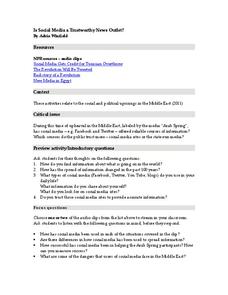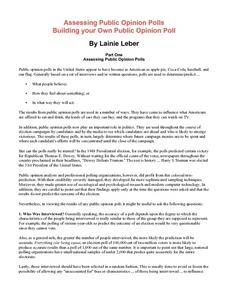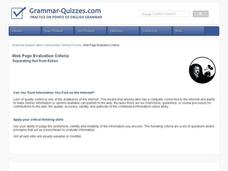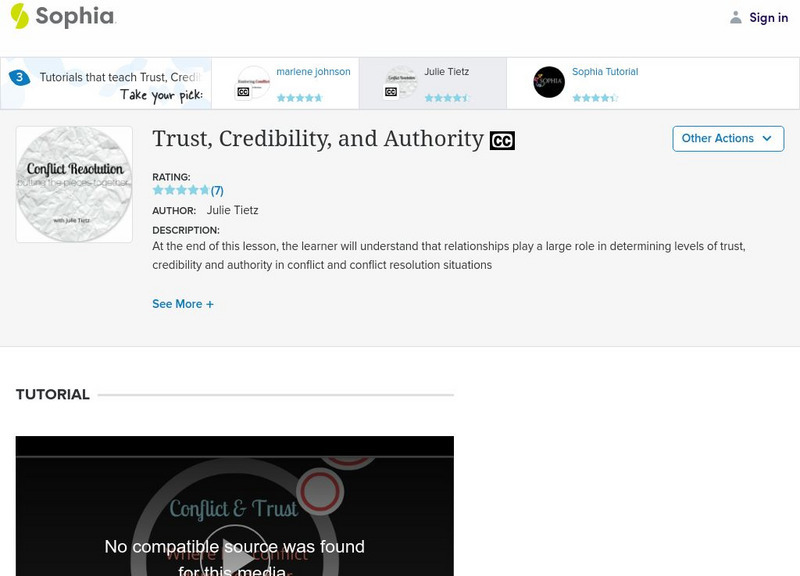Newseum
Can I Trust the Creators?
It's easy to find information at the click of a mouse, but is it trustworthy? Pupils learn about the E.S.C.A.P.E. acronym for evaluating sources. Next, learners read a news story and evaluate its sources to determine credibility. Last,...
Curated OER
Credible Sources on the Internet: What to Trust, What to Dismiss and When to Cite a Source
Wait, you mean researchers don't all use Wikipedia? Teach your class about intelligent research with a lesson about evaluating digital sources. The lesson starts with a quickwrite and includes vocabulary exercises and several...
Curated OER
Is Social Media a Trustworthy News Outlet?
Examine the role of social media in social and political uprisings. Pupils listen to NPR audio clips about social media and the Arab Spring and read an article that proposes the idea that revolution will not happen through social media....
Social Media Toolbox
Social Media Messages
What are the elements of a good social media post? The 13th activity in the 16-part Social Media Toolbox incorporates all of the typical components found in a Facebook or Twitter post. Scholars work together to create great posts based...
University of North Carolina
Letters of Recommendation
Letters of recommendation play a key role in the college admissions process. A handout on the topic, part of a series on specific writing assignments, helps applicants through the process of choosing recommenders and requesting a letter....
Curated OER
Pride and Prejudice by Jane Austen
For this online interactive reading comprehension worksheet, students respond to 9 short answer and essay questions based on Pride and Prejudice. Students may also access an online quiz on the selection using the link at the bottom...
Curated OER
Communications: Advertising in Schools
Students will become aware of advertising already in the schools and will work on critical thinking and debating skills.
Curated OER
Assessing Public Opinion Polls
Students are introduced to the purpose of public opinion polls. Using recent polls, they determine the demographics of who was interviewed and when and where the interview was conducted. In groups, they develop their own public poll...
Curated OER
Assessing Public Opinion Polls and Building Them
Students explore the role of public opinion polls in America. In this public opinion polls lesson plan, students discover the steps of analyzing poles before they create and conduct their own polls.
Curated OER
Separating Fact from Fiction
In this English grammar worksheet, students study a chart of definitions and pointers. Students then read 5 explanations as to how to separate fact from fiction.
Sophia Learning
Sophia: Trust, Credibility, and Authority: Who Counts for What?: Lesson 1
At the end of this lesson, the learner will understand that relationships play a large role in determining levels of trust, credibility and authority in conflict and conflict resolution situations. It is 1 of 3 in the series titled...
PBS
Pbs Learning Media: Why Is Fake News So Effective?
This lesson frames the controversial issues of fake news and trust in the media with the historical context of yellow journalism and sensationalist reporting. Students learn strategies for improving their media literacy and will be able...
Other
Babson College: Evaluating Quality on the Net
Internet research is a fine writing tool, but can you trust the information you find? This presentation by Hope N. Tillman, Director of Libraries at Babson College, gives advice on assessing the quality and credibility of information...
PBS
Pbs Learning Media: Common Sense Education: Identifying High Quality Sites
Learn how to "test before you trust" the sites and information found on the Web in this lesson plan and student handout from Common Sense Education. Assessing what you find on the Web is an essential skill for today's students. Use this...














